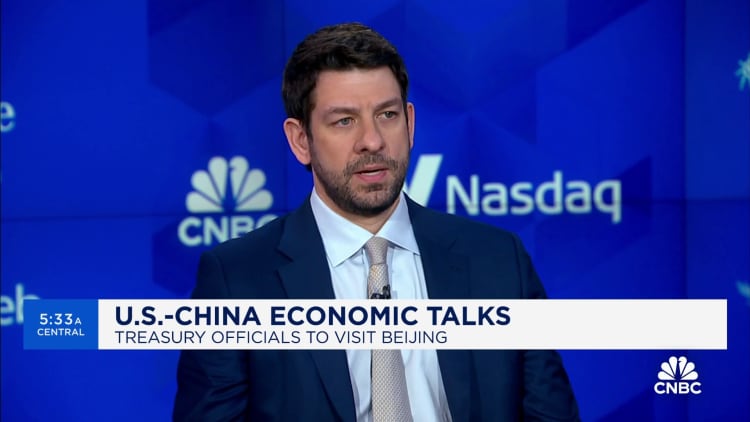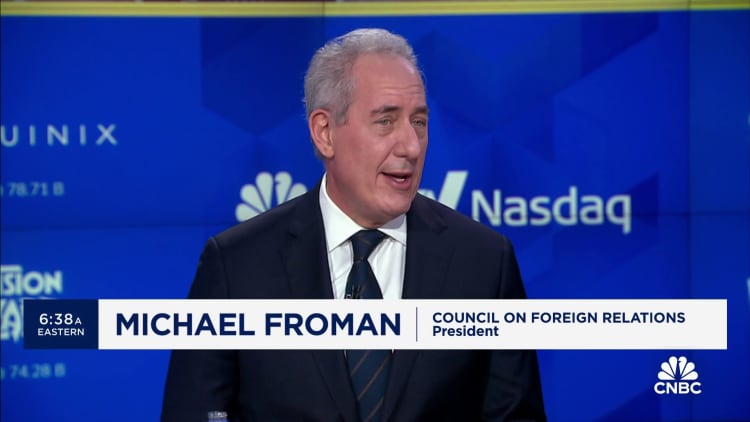Many Chinese developers have stopped or delayed construction of pre-sold homes due to cash flow issues. Pictured here is a real estate construction site in Jiangsu Province, China, on October 17, 2022.
Future publishing | Future publishing | Getty Images
China’s economy is stalling.
The housing market is crumbling, deflationary pressures are spreading across the country and the stock market has had a turbulent ride so far this year, with the country’s CSI 300 index having lost around 40% of its value since its 2021 highs.
January PMI figures released by China’s National Bureau of Statistics showed that manufacturing activity fell for the fourth consecutive month due to falling demand.
The flood of bad data has consequently triggered a wave of skepticism about the world’s second-largest economy. The alliance, in turn, changed its optimistic assessment of China and now forecast that Beijing’s economy will grow by an average of 3.9% between 2025 and 2029. That’s down from a forecast of 5% before the Covid-19 pandemic hit.
Former International Monetary Fund official Eswar Prasad also told Nikkei Asia that “the likelihood of predicting that China’s GDP will one day overtake that of the US is decreasing.”
Meanwhile, top economist and Allianz advisor Mohamed El-Erian highlighted in a chart
However, China itself is not ready to admit that its economy is in shambles. Chinese leader Xi Jinping said on New Year’s Eve that the country’s economy had become “more resilient and dynamic this year.”
Given this optimism, it’s fair to say that there have been some signs of hope for the struggling economy, but perhaps not enough to convince the bears. For example, factory activity in China increased for the third month in a row in January, while the country’s luxury sector appears to be bouncing back.
Such data has led to bullish talk among investors, suggesting that the consensus on China is clearly not uniform.
Era of stagnation
Nobel laureate Paul Krugman was among the most pessimistic voices about China, saying the country was entering an era of stagnation and disappointment.
China should boom after lifting its strict “zero Covid” measures, Krugman wrote in a recent New York Times editorial. But it did exactly the opposite.

From poor leadership to high youth unemployment, the country faces headwinds from all sides, Krugman argued. And the country’s economic difficulties are not an isolated case, warns Krugman, and could potentially become everyone’s problem.
Real estate crisis
China’s well-known real estate woes have been at the heart of Wall Street’s bearish stance on the Asian country.
The International Monetary Fund expects real estate demand in China to fall by 50% over the next decade.
Speaking at the World Economic Forum in Davos last month, IMF chief Kristalina Georgieva said China’s real estate sector needed to be “cleaned up” while Beijing needed structural reforms to prevent a decline in growth rates.
Meanwhile, famed hedge fund manager and founder of Dallas-based Hayman Capital Kyle Bass said the country’s heavily indebted real estate market has triggered a wave of defaults by public developers. That’s a problem considering China’s real estate market can account for up to a fifth of the country’s GDP.
“This is just like the U.S. financial crisis on steroids,” Bass said, referring to China’s failing real estate market.
“It’s going to get a lot worse in China, no matter how much regulators say, ‘We will protect individuals from malicious short selling,'” he added.
“The fundamental architecture of the Chinese economy is broken,” Bass continued.
Glimmer of hope
However, the bleak picture for China is not shared by everyone.
The Institute of International Finance said in a recent blog post that Beijing has the policy capacity to move China’s economy toward its growth potential, sticking to its aforementioned consensus forecast for 5% growth in 2024. However, this view depends on sufficient demand impulses. The latest GDP figures from China for the last three months of 2023 fell short of analysts’ estimates at 5.2%.

At the same time, Marko Papic, partner and chief strategist at Clocktower Group, expressed an optimistic short-term view of Chinese stocks. In a CNBC interview on Feb. 7, Papic said he expects Chinese stocks to rise at least 10% in the coming days as officials signal support efforts to shore up the flagging stock market.
“A 10 to 15 percent rally in Chinese stocks is likely in the coming trading days,” Papic said.
JPMorgan Private Bank also outlined bull case scenarios for China in a recent article. “Despite the gloomy mood in the stock market and ongoing problems in the real estate market, certain segments of the Chinese economy have also demonstrated their resilience,” it said.
The bank said China’s crucial role as a global manufacturer is unlikely to weaken, adding that cyclical demand for its exports may remain intact.
Looking ahead, China has hurdles to overcome. However, whether it has the firepower to do so remains to be seen.
Source link
2024-02-09 06:28:56
www.cnbc.com








